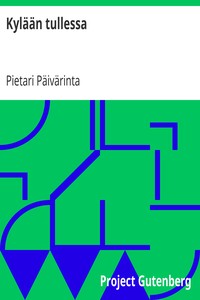| Summary |
"Kylään tullessa" by Pietari Päivärinta is a novel written in the late 19th century. This work appears to revolve around the journey of a thoughtful narrator and a curious boy as they travel together, exploring nature and engaging in philosophical discussions about life, beauty, and the human condition. The narrative is reflective and rich in observations, hinting at themes of morality, spirituality, and social critique that may unfold as the story progresses. The opening of the book presents a serene summer morning as the two travelers set out on their journey. The narrator contemplates the beauty of nature, the kindness of the Creator, and the ingratitude of humankind. Their conversation drifts from the appreciation of the natural world to deeper inquiries about knowledge and perception. The boy's initial inability to see the beauty around him sparks a dialogue about the importance of perspective and understanding, suggesting that true sight comes from an awakened heart and mind. As they approach a village and witness various social interactions, tensions arise between characters, providing a glimpse into the challenges faced by individuals in society. Through their journey, the reader is invited to reflect on personal and communal growth, making this opening not only a beginning of a journey through physical landscapes but also through the complexities of human relationships and moral discovery. (This is an automatically generated summary.)
|

